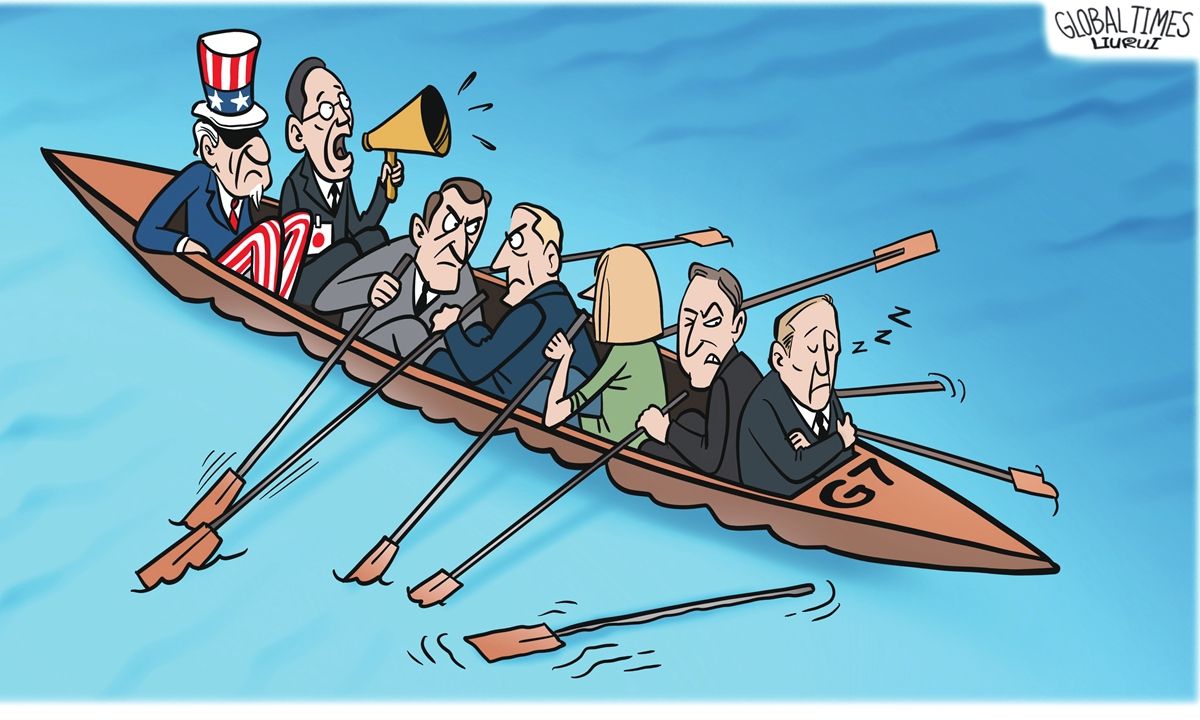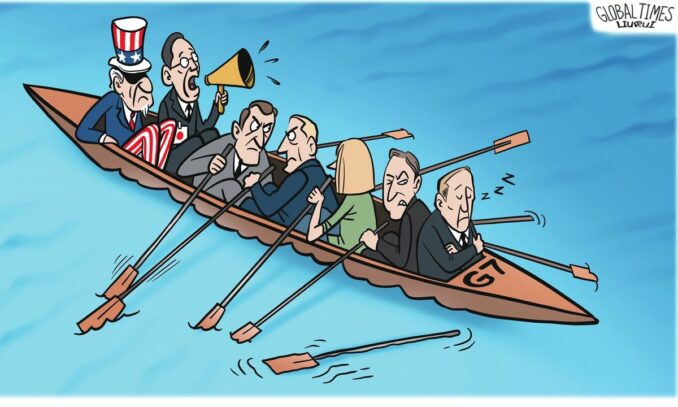

How the Global Times cartoonist sees the G7. Credit: Liu Rui/GT
Written by Jorge Cadima and published May 25 in Avante!, weekly newspaper of the Portuguese Communist Party. Translation by John Catalinotto.
Living in the illusion of past domination, the seven countries known as the G7 insist on trying to convey the idea that they are the seven largest economies in the world. But the reality is not what it used to be.


How the Global Times cartoonist sees the G7. Credit: Liu Rui/GT
According to the International Monetary Fund’s World Economic Outlook Database issued in April of this year, in Purchasing Power Parity Gross Domestic Product (PPP GDP), the seven countries rank only second (U.S.), fourth (Japan), fifth (Germany), ninth (France), 10th (Britain), 12th (Italy) and 15th (Canada).
Together, the five BRICS countries, with 32.1% of the world’s PPP GDP, have already surpassed the G7, who together have only 29.9%. China is in the first position; India is third; Russia is sixth; Brazil is eighth; and South Africa is thirty-third.
This year the G7 decided to meet in Hiroshima, Japan, site of the greatest crime in history, when the U.S. military inaugurated the nuclear age by committing a holocaust of the city’s civilian population. This crime was repeated three days later in Nagasaki.
CNN tells us that the G7 meeting site was chosen as a “reminder of the risks of nuclear war, while discussing Russia and the conflict in Ukraine.” (May 18) But the only country that has ever used nuclear weapons was sitting in the room, rules the G7 and defends its crime. Neither President Joe Biden, nor any other U.S. president, has ever even apologized for the 1945 atomic holocaust.
The G7 Summit was not meant to seek an end to the war in Ukraine and other conflicts in the world. On the contrary, it served to fan the flames of confrontation, particularly against China. It was a summit of escalating threats of war. The choice of Hiroshima thus takes on sinister contours, mimicking a message from organized crime.
The G7 communiqué repeats all the anti-Chinese rubbish. The Financial Times of May 20 headlined that the “G7 issues strongest condemnation of China as it intensifies response to Beijing.” It went so far as to write that the communiqué “criticizes China for everything.”
‘G7 is biggest risk to peace’
Speaking clearer language, the Chinese newspaper Global Times wrote that “U.S. intentions to replicate the ‘Ukrainian crisis’ in the Asia-Pacific region are clear.” In another article, it writes: “This is not just a matter of brutal interference in China’s internal affairs and smearing China, but also an undisguised urge for confrontation between the camps, which has made the G7 one of the biggest risks faced by peace and development in the world today.” (May 22) The protesters who filled the streets of Hiroshima said the same thing.
While the G7 stirs up the winds of war, for the first time in decades, some winds of peace are blowing in the Middle East. One reflects on the fact that, leaving Washington on the sidelines, it was possible for China to mediate an unthinkable reconciliation between Iran and Saudi Arabia. The agreement paved the way for Syria’s return to the Arab League and negotiations for a solution to the deadly conflict in Yemen.
But political and peaceful solutions are only possible when there is will. And the will of the U.S., EU, NATO and G7 is not directed toward peaceful political solutions. As has been proven in recent decades, the “diplomacy” of the imperialist powers is war.
The most reactionary sectors of big financial capital want war, hoping thereby to halt their system’s decline. They reject equality and peaceful coexistence. And then they wonder why they have no friends, while the line to join the BRICS grows longer every day.
The following call, “Gaza cries out to you – A global solidarity week to support…
Ever since the Donald Trump/Elon Musk administration took the reins of power in late January,…
The following is a letter from Workers World Party to the Workers Party of Korea…
Statement of the anti-imperialist Citizens’ Pole organization in Panamá, issued April 10, 2025. Translation: John…
Philadelphia Philadelphia’s transit system, the Southeastern Pennsylvania Transit Authority (SEPTA), released a budget on April…
By Gary Wilson The following is a guest article published first on April 10, 2025…